For more than a dozen years, the U.S. District Courts in the Eastern District of Texas – the courthouse in Marshall in particular – have ruled Texas as the premier jurisdiction for patent litigation.
The reign appears to be over.
New data obtained by The Texas Lawbook shows that the Western District of Texas – Waco, to be specific – is now, by a hair, the most popular jurisdiction in the state for businesses and individuals to file allegations of patent infringement.
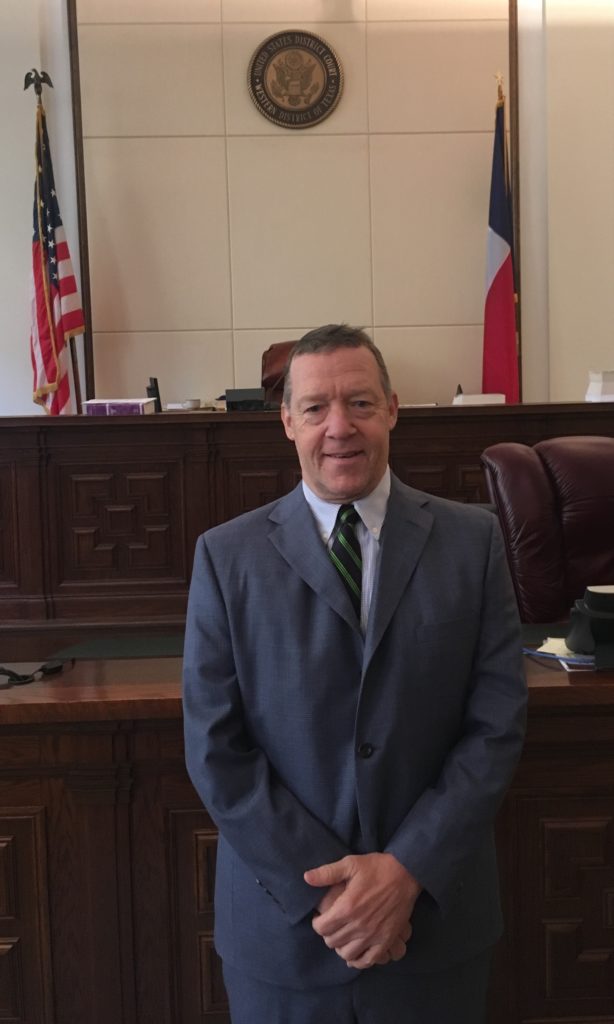
The credit, according to intellectual property law experts, goes to U.S. District Judge Alan Albright, a former intellectual property attorney who took the bench 14 months ago and has made his courtroom the newest hotspot for high-stakes patent litigation.
Legal experts say that Judge Albright has introduced new rules and procedures in patent cases that make his court “user friendly,” including accepting briefs and motions in an audio format so that he can listen to them while he drives and jogs.
“I have a true enthusiasm for patent cases,” Judge Albright told The Texas Lawbook in an interview this week. “I’m able to do things the way I wanted them done when I represented clients.”
During the past four months – July 1 through Oct. 31 – lawyers filed 112 patent lawsuits in the federal courts of the Western District of Texas compared with 108 such cases in the Eastern District, according to statistics compiled by Androvett Legal Media for The Texas Lawbook.
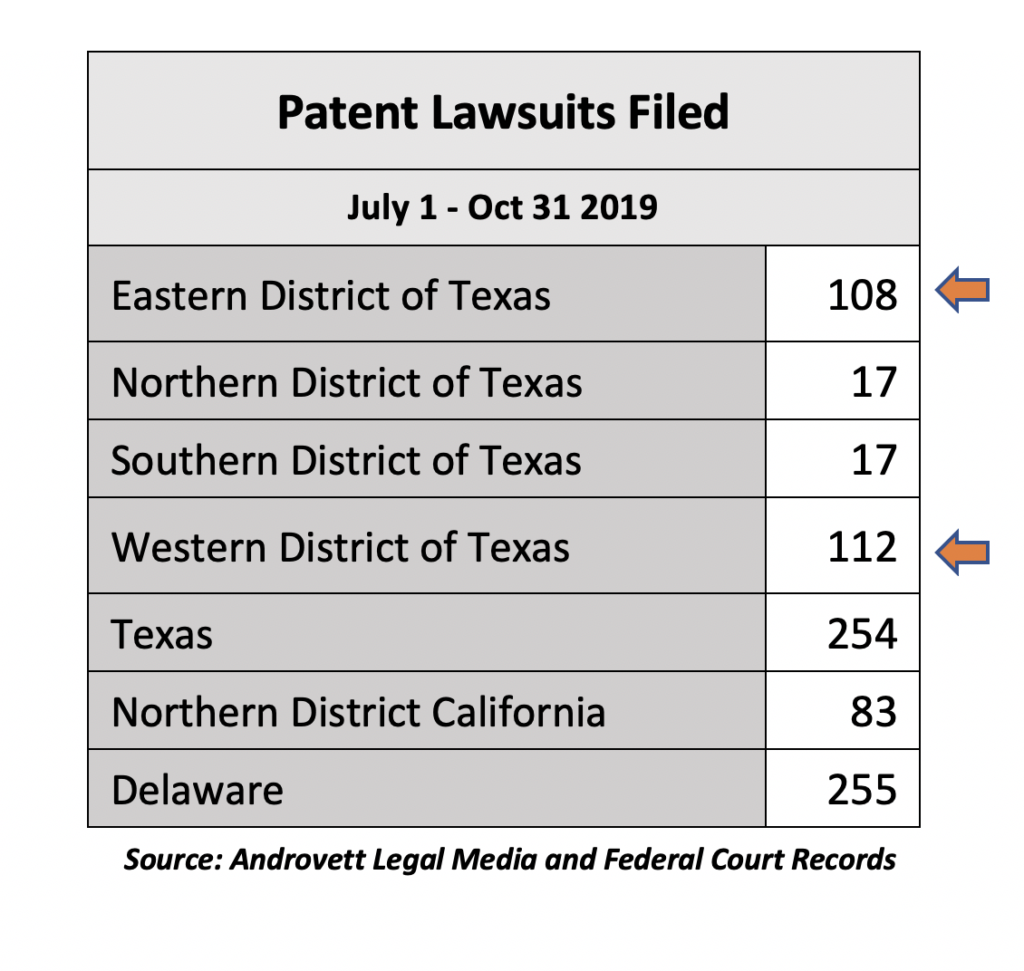
Those numbers dwarf the 17 patent infringement complaints filed in each the Northern District and Southern District of Texas.
The Androvett data shows that the federal courts in Delaware are by far the most popular jurisdictions for patent litigation. The Central District of California, specifically courts in Los Angles, ranks a distant second.
The Eastern and Western districts of Texas appear to be neck-and-neck for the third spot.
“This isn’t a competition and it isn’t an effort to replace any other jurisdiction but to make [Waco] an additional forum,” said Judge Albright. “I’ve tried patent cases in nearly every division in the Eastern District and I think the world of the judges in the Eastern District. They heavily informed how I established my docket here. The popularity of the Eastern District for patent cases is never going to go away.”
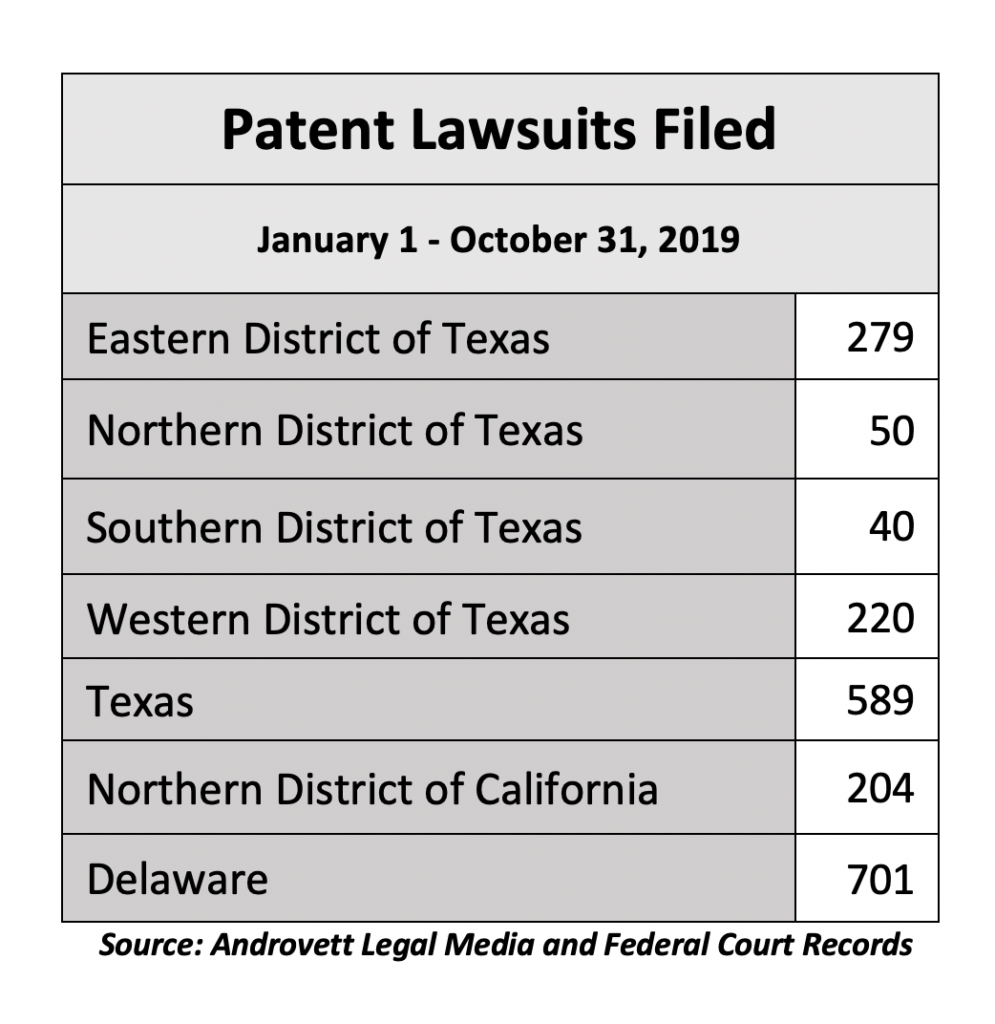
Before Judge Albright took the federal bench in September 2018, less than a dozen patent infringement cases had been filed in Waco. Ever.
More than 250 patent lawsuits have been filed there during the past 14 months.
“This demonstrates the impact that one judge can have on a patent docket,” says Baker Botts partner Tim Durst.
Other IP legal experts agree.
“It has to be the right judge and Judge Albright is out of central casting for the type of patent judge everyone wants,” says Tom Melsheimer, managing partner at Winston & Strawn in Dallas.

Mary-Olga Lovett, senior vice president and co-regional operating shareholder of Greenberg Traurig’s Texas offices, said Judge Albright’s focus on patent litigation “is an exciting development” for trial lawyers.
“I’m always happy when litigation comes to Texas,” said Lovett. “It’s neat to see another center for patent litigation open in Waco.”
A 1984 graduate of the University of Texas School of Law, Judge Albright served as a federal magistrate judge for seven years and then practiced law at a handful of Texas firms, including Fish & Richardson and Bracewell. In January 2018, President Trump nominated him to the Article III judgeship. The U.S. Senate approved him eight months later on a voice vote.
Judge Albright chose to sit in Waco and immediately established a task force to help him develop rules and procedures for the patent docket. He hired a law clerk with patent litigation experience.
“We tried to make the process as open and fair as possible,” he said. “I wanted to come up with a system that is as trial lawyer friendly as possible. I see it like a field of dreams.”
Because there had been no federal judge sitting in Waco in more than three years, Judge Albright had the benefit of assuming an extremely light caseload.

The result, he said, is that he can set Markman hearings, which determine the meaning of key words used in a patent claim, just about any day the parties choose and he issues his Markman decisions quickly – sometimes the same day. Then he sets trial dates 12 to 16 months later.
“I had the privilege of going to a division that didn’t already have a packed civil docket,” Judge Albright said. “So, I have the flexibility right now to give the parties a substantial amount of time to try lengthy patent cases.”
Melsheimer said that few civil cases were filed in Waco because trial lawyers viewed the previous judges there as unappealing for conducting trials.
“No one fears being in front of Judge Albright,” he said. “In fact, lawyers enjoy being in his court because he has a cheerful demeanor on the bench at all times.”
So far, the judge is getting rave reviews.

“The fact that we have a judge who knows patent law, I can’t say how important that is,” said Michael Hatcher, a partner at Sidley Austin in Dallas. “He has set up rules that provide certainty on how things will go.”
Wasif Qureshi, a partner at Jackson Walker in Houston, said that Judge Albright’s experience and sophistication on patent law is evident.
“He’s a trial lawyer who has actually tried patent cases,” Qureshi said. “He will let the parties duke it out. He is not afraid to go to trial.”
Durst said that Judge Albright’s invitation to lawyers to file their briefs in an audio format is “creative” and is “insightful into how productive he plans to be” as a judge.
Judge Albright said he started listening to audio recordings of U.S. Supreme Court oral arguments while he was preparing for his judicial nomination hearings.
“I learned that I digest information by audio,” he said. “So, my clerks put the audio recorded briefs on Dropbox, and I listen on Bluetooth when I’m driving and when I walk and run.”
Some law firms have hired professional readers to do their audio recordings, according to lawyers.
Melsheimer and Durst point out the importance of knowing positive that you get Judge Albright handling your case when lawyers file in the Waco Division.
“Certainty in who the judge will be is very important and not to be overlooked as a factor when deciding where to file a case,” Durst said.
While the focus right now is on the Western District, legal experts agree that the Eastern District will remain a favorite jurisdiction for patent plaintiffs who are eligible to file their cases there.
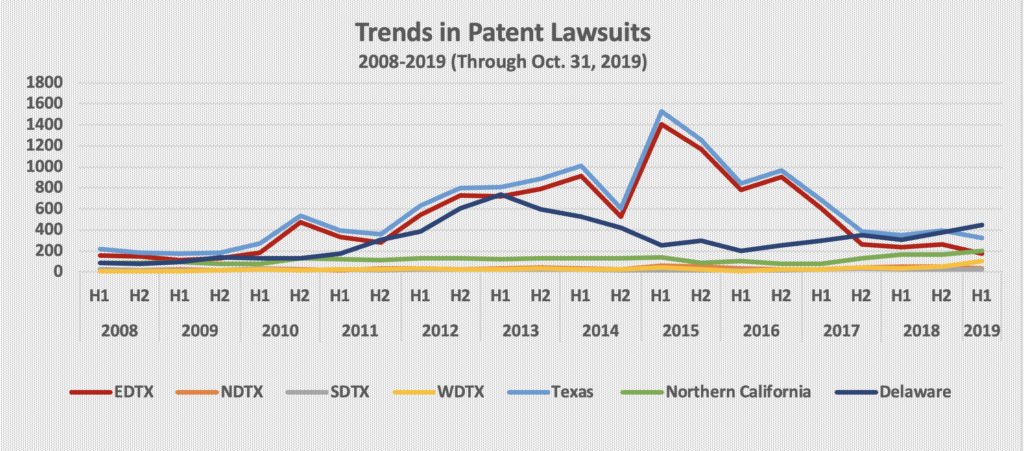
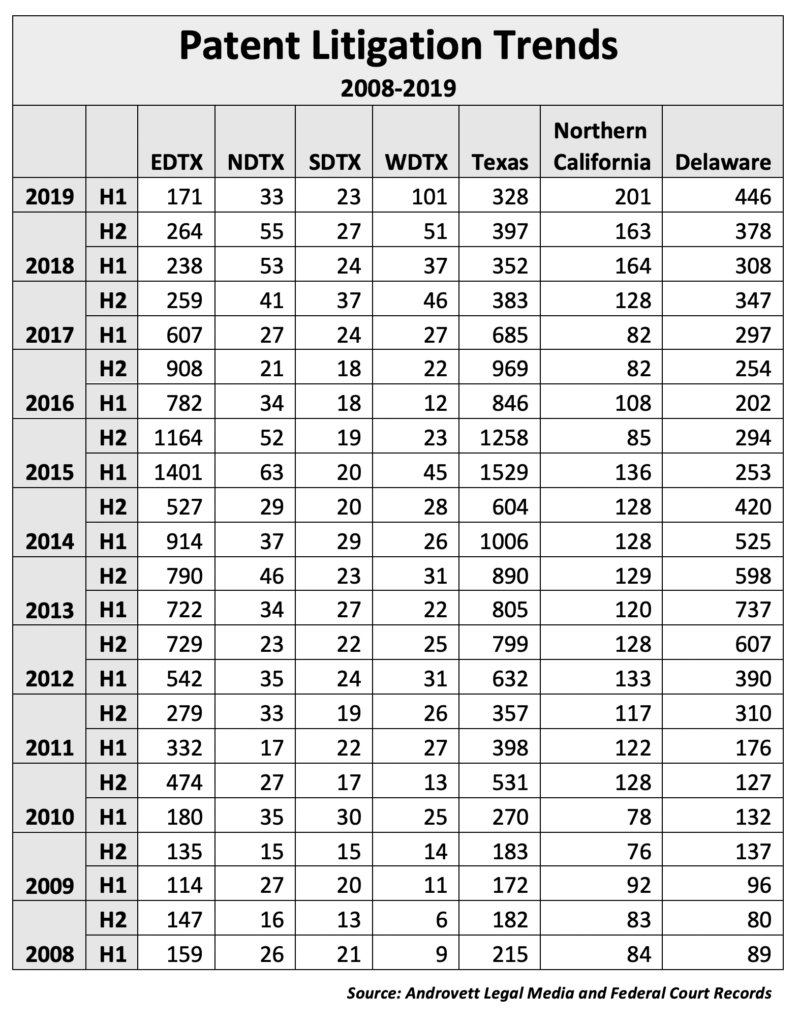
The Eastern District is on pace to register about 330 new patent lawsuits in 2019, which would be its lowest annual total since 2009 and down from 502 in 2018 and way down from 2,565 in 2015, according to the Androvett data.
The Eastern District’s docket suffered a major blow in 2017 when the U.S. Supreme Court decision in TC Heartland v. Kraft Foods limited the jurisdictions where plaintiffs could file complaints to the locations where the defendants actually committed the patent fraud or where they have an established place of business.
For years, some corporations have demonized the Eastern District as very pro-plaintiff and too quick to hand out eight- and nine-digit damage awards. Apple actually shuttered two of its popular stores in malls in Plano and Frisco – both in the Eastern District – after a jury in Tyler slapped the tech giant with a $502 million patent infringement judgment.
By contrast, companies such as AT&T have shown no hesitation to file patent cases in the Eastern District.
Apple, Google, Microsoft and most of the large tech companies have operations in Austin and San Antonio, which give jurisdiction to the Western District. Patent lawsuits against Dell, Cisco and Samsung have already been filed in Waco.

“The Western District covers more economic centers of activity because it includes Austin and San Antonio,” Qureshi said. “That makes it easier for Judge Albright to hold venue in his jurisdiction than the judges in the Eastern District.”
Lawyers also note that Judge Albright has denied almost every defense motion to transfer cases out of his jurisdiction, though he’s only had about a dozen so far.
“The No. 1 question mark for Waco is, ‘What is the jury pool like,’” said Melsheimer. “The demographics are similar to the Marshall Division, but we just don’t know because so few big civil cases have been tried there.”
Lovett said that too many lawyers prejudge Texas jurors as pro-plaintiff or pro-defense.
“The peril for anyone who comes into Waco or the Eastern District is to think that the people there are not as sophisticated,” she said. “Texas jurors believe the property rights are important and that innovation needs to be respected. Do not discount the common sense of Texas jurors.”
Judge Albright said he has set his first patent cases for trial this next spring.
